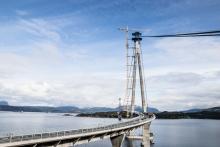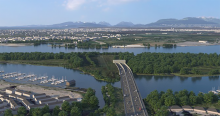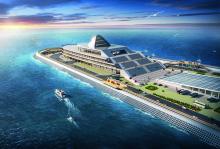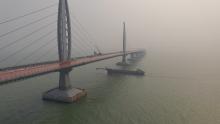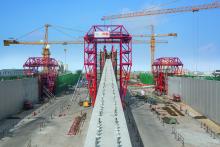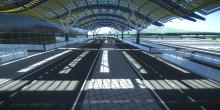Engineering group Cowi and architecture firm Dissing+Weitling have won the tender for construction of a bridge and tunnel project to connect the Chinese cities of Shenzhen and Zhongshan.
The US$5.51 billion 24km project in the southern province of Guangdong will include the world’s widest immersed road tunnel, two signature suspension bridges and two artificial islands.
The road in the Pearl River Delta will have eight traffic lanes in two directions and a daily capacity of 90.000 cars, according to a
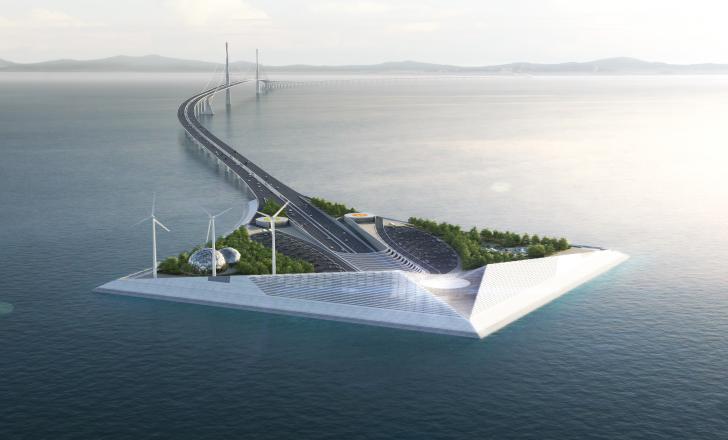
The artificial island will have 15,000m2 of conference, office and restaurant facilities (courtesy of Cowi)
Engineering group 2349 Cowi and architecture firm Dissing+Weitling have won the tender for construction of a bridge and tunnel project to connect the Chinese cities of Shenzhen and Zhongshan.
The US$5.51 billion 24km project in the southern province of Guangdong will include the world’s widest immersed road tunnel, two signature suspension bridges and two artificial islands.
The road in the Pearl River Delta will have eight traffic lanes in two directions and a daily capacity of 90.000 cars, according to a statement by Cowi.
At the moment, Humen Bridge is the only span connecting both sides of the delta. Although it was opened only in 1997, it is heavily congested. It consists of two main spans - a suspension bridge section and a segmental concrete section. It connects the Nansha District of Guangzhou to Humen Town of Dongguan. The suspension bridge has a main span of 888m and the segmental concrete section's main span of 270m is one of the longest such spans in the world.
The competition for a new crossing was organised last September by The Advanced Work Office for the ShenZhong Link Project. Cowi and Dissing+Weitling are based in Denmark.
“I simply knew from the first glance, that I was looking at an extraordinary project," said Lars Hauge, regional vice president of Cowi.
"One of our primary advantages as a team is that we have vast experience both with large suspension bridges, immersed tunnels and marine engineering. Moreover we have had an excellent teamwork with the architect DISSING + WEITLING Architecture, with whom we have a long-standing and excellent working relationship.”
Among other projects that Cowi and Dissing+Weitling have collaborated on is the Danish fixed link, an 18km crossing of the Great Belt linking the eastern and western parts of Denmark.
Both companies were also deeply involved in the Öresund Bridge linking Copenhagen with Malmoe, Sweden, as well as the Hong Kong – Zhuhai – Macao link, now under construction.
"The design is a synthesis of the requirements and constraints of the Pearl River's estuary where shallow and calm water has been a great inspiration calling for elegance and harmony. The island is designed to minimise blocking effect in the water, the shape similar to a classic Chinese kite and combined with the bridges, the entire link can visualise a kite with tail elegantly landing on the water," said Poul Ove Jensen, architect in Dissing+Weitling.
In their comments the jury said that the “the whole link is in harmony with the surrounding environment, the Y shaped pier shaft of approach bridges give a very strong sense of rhythm".
Guangdong is one of the richest provinces in China. Besides agriculture and marine products, the strong provincial economy is based largely on light and heavy industries which the Chinese authorities believe will benefit from a better road link.
The new link will be part of this upgrade in and around Guangdong and the Pearl River Delta. Among other advantages, it will create a more direct connection between the western and the northern parts of the river and should decrease the traffic through Guangdong.
• The 24km ShenZhong Link will be the widest immersed tunnel in the world, with the widest road bores ever built, between 19m and 38m.
• The longest suspension bridges have a bridge span of 1,588m and a twin box girder to enable optimal wind stability
• The proposed concept is for a post-tensioned segmental tunnel consisting of 31 elements. A typical element will be 18m long and the widest being up to 70m wide.
• The artificial island will have a promenade and host 15,000m2 of conference, office and restaurant facilities.
The US$5.51 billion 24km project in the southern province of Guangdong will include the world’s widest immersed road tunnel, two signature suspension bridges and two artificial islands.
The road in the Pearl River Delta will have eight traffic lanes in two directions and a daily capacity of 90.000 cars, according to a statement by Cowi.
At the moment, Humen Bridge is the only span connecting both sides of the delta. Although it was opened only in 1997, it is heavily congested. It consists of two main spans - a suspension bridge section and a segmental concrete section. It connects the Nansha District of Guangzhou to Humen Town of Dongguan. The suspension bridge has a main span of 888m and the segmental concrete section's main span of 270m is one of the longest such spans in the world.
The competition for a new crossing was organised last September by The Advanced Work Office for the ShenZhong Link Project. Cowi and Dissing+Weitling are based in Denmark.
“I simply knew from the first glance, that I was looking at an extraordinary project," said Lars Hauge, regional vice president of Cowi.
"One of our primary advantages as a team is that we have vast experience both with large suspension bridges, immersed tunnels and marine engineering. Moreover we have had an excellent teamwork with the architect DISSING + WEITLING Architecture, with whom we have a long-standing and excellent working relationship.”
Among other projects that Cowi and Dissing+Weitling have collaborated on is the Danish fixed link, an 18km crossing of the Great Belt linking the eastern and western parts of Denmark.
Both companies were also deeply involved in the Öresund Bridge linking Copenhagen with Malmoe, Sweden, as well as the Hong Kong – Zhuhai – Macao link, now under construction.
"The design is a synthesis of the requirements and constraints of the Pearl River's estuary where shallow and calm water has been a great inspiration calling for elegance and harmony. The island is designed to minimise blocking effect in the water, the shape similar to a classic Chinese kite and combined with the bridges, the entire link can visualise a kite with tail elegantly landing on the water," said Poul Ove Jensen, architect in Dissing+Weitling.
In their comments the jury said that the “the whole link is in harmony with the surrounding environment, the Y shaped pier shaft of approach bridges give a very strong sense of rhythm".
Guangdong is one of the richest provinces in China. Besides agriculture and marine products, the strong provincial economy is based largely on light and heavy industries which the Chinese authorities believe will benefit from a better road link.
The new link will be part of this upgrade in and around Guangdong and the Pearl River Delta. Among other advantages, it will create a more direct connection between the western and the northern parts of the river and should decrease the traffic through Guangdong.
• The 24km ShenZhong Link will be the widest immersed tunnel in the world, with the widest road bores ever built, between 19m and 38m.
• The longest suspension bridges have a bridge span of 1,588m and a twin box girder to enable optimal wind stability
• The proposed concept is for a post-tensioned segmental tunnel consisting of 31 elements. A typical element will be 18m long and the widest being up to 70m wide.
• The artificial island will have a promenade and host 15,000m2 of conference, office and restaurant facilities.

